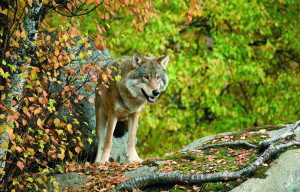Large Carnivores in Central Europe – Workshop
Fuentes del Narcea Nature Park (Spain) © Alto Narcea Muniellos Development organisation
During centuries, European large carnivores suffered dramatic declines in numbers and distribution as a consequence of human activity. Across Europe, scattered individuals and small populations survived in remote areas where human presence could be avoided.
Nowadays, the situation has changed, with most populations of brown bear, wolf, wolverine, Iberian lynx and Eurasian lynx stabilizing (even increasing) and spreading across new areas. Farmland abandonment, the growth of forest areas, the increase of prey species and the existence of favourable laws for these species are some of the reasons for their successful growth. But after so many decades without the presence of large carnivores, we have to relearn how to coexist, by increasing our cooperation with our peers to find solutions and build a dialogue with the main actors affected by their presence.
In order to tackle the current situation, the European Commission created the EU Platform on Coexistence between People and Large Carnivores, where representatives of different interests groups come together to find solutions and exchange knowledge. EUROPARC Federation has an active role in the platform, representing the interests of European Protected Areas.

Wolf © Rodopi National Park, Greece
An interesting workshop will take place between the 18th – 20th April, in Berlin, where Protected Areas can positively contribute for the debate on the coexistence between people and large carnivores.
The workshop will focus Large Carnivores in Central Europe and is organised by WWF and NABU (Birdlife Germany) under the EU Platform on Coexistence between People and Large Carnivores. The main aim of the workshop is to share ideas and best practices on monitoring and management, with specially concerning cross-border cooperation and conflict resolution between different stakeholders.
Protected Areas and organisations are invited to participate and share their experiences, and the deadline for applications is the 20th March.
Find out all details in the document below.
Downloads
TransParcNet meeting 2016 of the EUROPARC FEDERATION in Saxon-Bohemian Switzerland
Participants of TPNet meeting 2015 in Bavarian-Bohemian Forest NPs
„Visitor Management in Protected Areas”
We are very grateful to Bohemian Switzerland National Park, Labské pískovce Protected Landscape Area (CZ) and Saxon Switzerland National Park (DE) for hosting and organising this event from Tuesday 7th to Friday 10th June 2016 in Bad Schandau (DE). This year’s meeting will focus on “Visitor Management in Protected Areas” in transboundary regions.
Full information, programme and registration are available here: http://www.npcs.cz/tpn2016
We are very pleased to invite you to the annual TransParcNet meeting 2016. The meeting will take place in Saxon-Bohemian Switzerland at the German-Czech border. We look forward to welcoming you f
Registration
The on-line registration, including reservation of accommodation, is available on the homepage of Bohemian Switzerland NP. Please note that the deadline for registration is April 22, 2016.
EUROPARC Journal PA In-Sight is out!
EUROPARC Federation is proud to share the latest edition of our Journal Protected Area In-Sight. “Protected Areas in a Changing world” is the subject and was the theme of EUROPARC Conference 2015, held in Regensburg. There we discussed some of the main challenges and changes faced by Protected Areas.
Change is an ever-ending process that protected areas need to embrace, so we bring you some practical examples and inspiration from across Europe. Moreover, our keynote speakers share some macro-level changes such as climate change, natural capital, European policy, personal change and the role of youth in parks.
Also in this edition, you will have a big picture of the variety of protected area´s management across Europe, with our EUROPARC sections sharing local challenges and unveiling solutions that are being put into practice.
Soon, our members will receive a printed copy, in the meantime, feel free to share the digital version with your colleagues.
The EUROPARC team wishes you a happy reading!